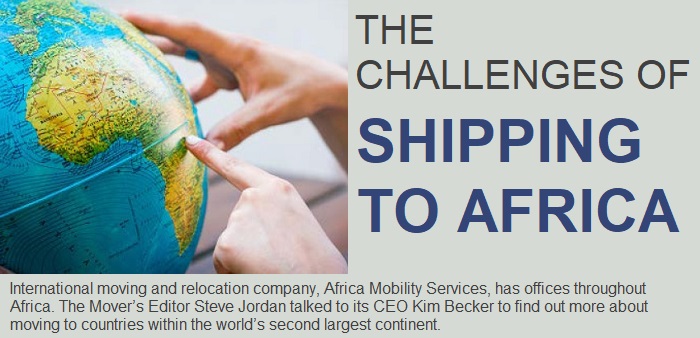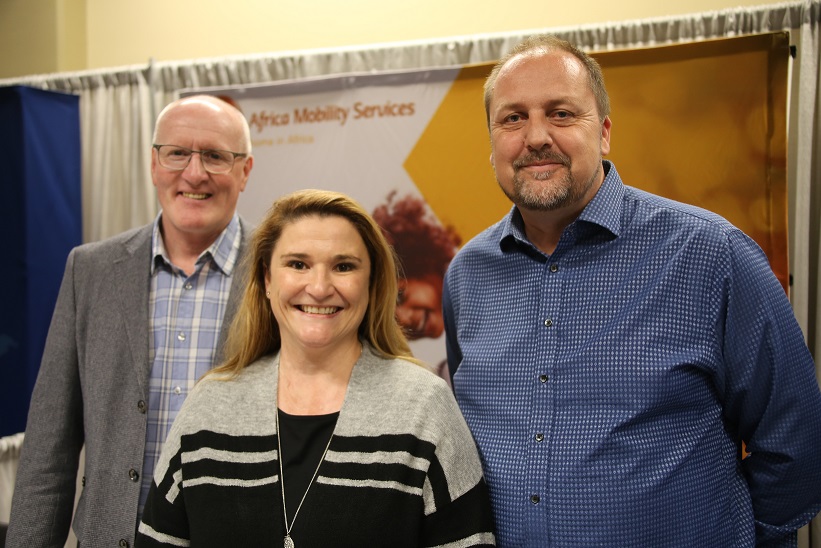International moving and relocation company, Africa Mobility Services, has offices throughout Africa. The Mover’s Editor Steve Jordan talked to its CEO Kim Becker to find out more about moving to countries within the world’s second largest continent.

Africa Mobility Services (AMS) began operating in 2011 and has four offices and 21 AMS Alliance offices throughout Africa with move management teams based in Johannesburg and Cape Town. For many people in the moving business, Africa is something of an unknown quantity, so I was keen to learn more about the challenges moving people to this vast, diverse continent presents and what shippers need to know to make sure things go smoothly.
AMS’s CEO Kim Becker has been in the relocation business for over 20 years and was formally managing director of Santa Fe Relocations in India. As a true South African and African at heart, he is ideally suited to his role, with a deep understanding of African culture, along with the bureaucratic and physical processes involved in transporting goods across the continent.
 Kim frequently gives presentations to people working for moving companies and RMCs who actually make the decisions. “One of the first questions I ask the audience when I give presentations, especially in the United States is, ‘How many of you have been to Africa?’ Almost without exception the answer is none, so that gives me the opportunity to talk about some of the myths people have about moving to African countries,” said Kim. “One is that Africa is full of third-world-countries that are not that sophisticated when it comes to customs regulations and documentation. That isn’t true. For example, anyone moving to an African country needs a personal, not a company, tax identification number before being allowed into the country so that tax can be collected both from the consignment and the assignee’s income. Also, because there have been instances of people shipping expensive cars and such along with household affects, customs officers are now very fastidious when they check inbound containers. Because there is high unemployment, countries in Africa don’t generate enough tax, so they need to make as much money as they can from expats.”
Kim frequently gives presentations to people working for moving companies and RMCs who actually make the decisions. “One of the first questions I ask the audience when I give presentations, especially in the United States is, ‘How many of you have been to Africa?’ Almost without exception the answer is none, so that gives me the opportunity to talk about some of the myths people have about moving to African countries,” said Kim. “One is that Africa is full of third-world-countries that are not that sophisticated when it comes to customs regulations and documentation. That isn’t true. For example, anyone moving to an African country needs a personal, not a company, tax identification number before being allowed into the country so that tax can be collected both from the consignment and the assignee’s income. Also, because there have been instances of people shipping expensive cars and such along with household affects, customs officers are now very fastidious when they check inbound containers. Because there is high unemployment, countries in Africa don’t generate enough tax, so they need to make as much money as they can from expats.”
As well as dealing with the authorities Kim explained that it’s also important to know how local traditions and religions can affect a consignment.
“Kim explained, “In the Sudan, Ethiopia and Egypt, for example, Fridays and Saturdays are holidays, so that needs to be remembered when shipping to those countries. During the festival of Eid, Muslim countries close down for a week and during exam time in Ethiopia the government switches off the Internet to stop the students cheating, it’s important to know about these things.”
I asked Kim what part the infrastructure played in the shipment of consignments.
“The roads and railways vary a lot in quality depending on where you are, but the biggest challenge is getting through the borders, which can take several days,” said Kim. “At some crossings thieves will steal things such as mirrors and spare wheels from the trucks while we’re waiting in the queue, so we need to have a second person on board to guard them,” said Kim. “We recently had a consignment going from Johannesburg to Angola and it was quicker and easier to put it on a ship and send it through the port of Luanda than take it by road. In Africa it’s not always the shortest most direct route that is best.”
“If there was just one piece of advice I’d give to shippers, it would be this. Always wait until we give you the green light before shipping a consignment. All the paperwork, visas, work permits, personal tax number, etc. must be in place before the shipment leaves your warehouse. If a container arrives in Africa without all the correct documentation it will be sent back to where it came from. There are a few countries, Kenya for example, that will impound the consignment until the documentation arrives and then sell it back to the owner at a price. That’s expensive!”
Africa Mobility Services is a member of IAM (International Association of Movers) and the Harmony Relocation Network.
Photo, left to right: COE Kim Becker; Business Development Manager, Charnel Francis; and Country Manager, Paul Waller.